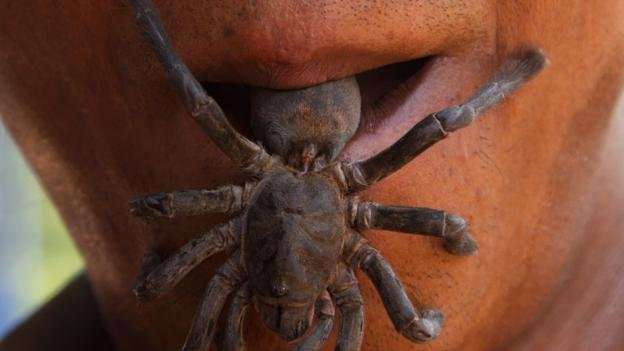Could it be true? Could spiders really be climbing into our mouths at night? If not, how come so many of us have swallowed this as fact?
We posted the question on the BBC Earth Facebook page to see if we could establish the truth.
“If we do I don't really want to know it,” says Margie Williamson, a sentiment that many of you echoed. “Please tell me this is a myth or I will bandage my mouth up,” says Claire Jeyes.
Spiders have been known to inhabit ear canals, as in the case of this Chinese woman who went to Changsha Central Hospital of Otolaryngology and Head and Neck Surgery with an itchy ear. Similarly, in 2014 the singer Katie Melua revealed that a jumping spider had hitch-hiked its way into her auditory canal on a pair of earbud headphones.
“Pretty sure that proves they are not above crawling inside a human,” writes Juli Marie on BBC Earth’s Facebook page.
In the medical literature, there are cases of spiders biting people whilst they sleep. In a study of white-tail spider bites in Australia, around one in three people reported they had been bitten whilst they slept.
Recluse spiders of the genus Loxosceles are also mostly active at night and can give a bad enough bite to send people to hospital. A review of these injuries suggests that most of them tend to be on a limb, hand or foot, though there are occasional bites to the face, including one to an 8-year-old girl’s eyelid whilst she slept.
Some of you have had a similar nocturnal encounter with a spider.
When I awoke I could feel something in my mouth between my lower teeth and gum so put my finger in and scooped out a small spider
“I once got bit on the face by a spider while I was asleep,” says Wendy Marshall. “We lived in South Africa at the time. The doctor said it was probably crawling across my face and I've disturbed it! Thankfully it will have been far too big to swallow.”
Sue Mazer has a friend who woke up “with a thousand pin sized bites all over her face as a result of an egg sac opening up at night above her bed”.
Anecdotes like these are pretty good evidence that spiders will stray onto the face of a sleeping person and, on occasion, they might even enter a mouth. Mudassirul Waris claims that he was brushing his teeth one morning when he became aware of an unusually “funky smell” in his mouth and spat out “what appeared to be the legs of a common house spider”.
Similarly Paul Dixon recalls a time when he was living in a converted attic. “When I awoke I could feel something in my mouth between my lower teeth and gum so put my finger in and scooped out a small spider,” he says. “It happens.”
If this is making some of you anxious, it’s probably time to bring in Dave Clarke, head of invertebrates at London Zoo in the UK.
“Most predators won’t tackle anything bigger than themselves because they are likely to come off worse,” says Clarke. Spiders are highly sensitive to both vibrations and heat so are unlikely to stumble across a human unawares. “They are just not interested in us at all really,” he says.
It has not been possible to confirm the existence of either Holst or the article she is supposed to have written
Clarke’s expert opinion is echoed by Karen Collins’ eight-year-old daughter. “Spiders aren't silly enough to be eaten by us,” she says. “Anyway the snoring will scare them away!”
As comforting as this is, it seems only reasonable to assume that the odd arachnid will occasionally find itself inside the mouth of an unfortunate human, particularly if we include mites (Jan Tegner and Sabine Lafazani). But how often might this be happening?
Craig Beattie has heard that the average accidental, nocturnal consumption of spiders is seven per year. Ann Aylmer agrees that it’s seven, but reckons this is the number of spiders we swallow in a lifetime. No, say Sara Winardi, Janelle Loader, Bobbi O’Dwyer, Susie Que and Adalia Kroblen: the correct statistic is eight in a lifetime. Jon Parker is not buying any of this: “How on Earth would we know?”
Indeed, the specificity of these claims is more than a little suspicious.
According to Kenneth Knutsen, such assertions originate from a PC Professional article published in 1993 in which columnist Lisa Holst made up bogus “facts” to demonstrate the gullibility of email recipients. “In a delicious irony,” writes Knutsen, “Holst’s propagation of this false ‘fact’ has spurred it into becoming one of the most widely-circulated bits of misinformation to be found on the internet.”
But Knutsen may not have the last word on irony.
The idea that Lisa Holst is the originator of the spider statistic is reported in an article on snopes.com, a website dedicated to clearing up internet rumours and urban legends. As yet, however, it has not been possible to confirm the existence of either Holst or the article she is supposed to have written, raising the ironic possibility that snopes.com might need to shine a light on itself.

byllz on February 27th, 2018 at 04:11 UTC »
Who here didn't read the article or check it's sources? Ironically the claim in the title may just be full of shit.
"According to Kenneth Knutsen, such assertions originate from a PC Professional article published in 1993 in which columnist Lisa Holst made up bogus “facts” to demonstrate the gullibility of email recipients...As yet, however, it has not been possible to confirm the existence of either Holst or the article she is supposed to have written"
Friendlyverse on February 27th, 2018 at 03:43 UTC »
I'll take your word for it.
Redrump1221 on February 27th, 2018 at 03:41 UTC »
Is this a new trick to see if we still don't check sources? (Didn't check sources)